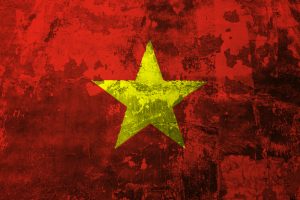2021 in Vietnam is ending in much the same way as it began, with the imprisonment of high-profile critics of the Vietnamese Communist Party (VCP). This time it was the turn of the democracy advocate and woman human rights defender Pham Doan Trang, who was sentenced to nine years imprisonment at a court in Hanoi yesterday after being charged with “conducting propaganda against the state.”
Observers will be disappointed, but few will be surprised. Today’s news follows the publication of the latest annual report by the Committee to Protect Journalists, which listed Vietnam as having the fourth highest number of imprisoned journalists in 2021. Hopes for Trang were raised slightly in October, however, when her initial trial date of November 4 was delayed following a report by the UN Working Group on Arbitrary Detention (UNWGAD). The statement expressed concern at Trang’s arrest, deemed her arrest to be politically motivated, and called for her immediate release. Officially, the trial was delayed after two members of the prosecution were forced to self-isolate, but observers were hopeful that the UNWGAD statement had pressured the authorities to reconsider a conviction.
Trang’s arrest last year was the culmination of years of harassment by the Vietnamese authorities. Trang was first detained in 2009 whilst working for state media after being accused of printing t-shirts expressing opposition to controversial plans to open up the Central Highlands to bauxite mining. Three years later Trang was arrested while participating in an anti-China protest following rising tensions over the disputed maritime borders between China and Vietnam. In 2016 she was once again detained whilst travelling to meet the visiting U.S. President Barack Obama in Hanoi.
Undeterred, Trang continued to publish books and reports promoting democracy and commenting on a range of politically sensitive topics, from the 2016 Formosa environmental disaster to the controversial Dong Tam land dispute, which left one village elder and three policeman dead after a violent clash between police and villagers on the outskirts of Hanoi. In 2014, Trang founded the online magazine Luat Khoa, which provides independent analysis of political and legal issues inside Vietnam. The evidence against Trang offered by the prosecution included reports on human rights issues in Vietnam, and interviews conducted with Radio Free Asia and the BBC. The importance of Trang’s work was recognized in 2019 when she awarded the Press Freedom Award for Impact by Reporters without Borders. Her conviction is another heavy blow against independent journalism in Vietnam.
Today’s news serves as a reminder that the Vietnamese government feels as though it has the freedom to act with impunity from the international community. That Vietnam is next year likely to be elected as a member of the U.N. Human Rights Council adds insult to injury after what has been a dispiriting year in the country. Sometimes it seems as though Vietnam’s behavior is deliberately intended to make a mockery of human rights. Trang’s arrest on October 6 last year came just hours after the conclusion of the 24th annual human rights dialogue conference held with the U.S. government.
Observers are bracing themselves for further disappointment this week. Today, December 15, will see the trials of land right activists Trinh Ba Phuong and Nguyen Thi Tam. Like Trang, their original trial dates at the beginning of November were delayed. Recent state media reports suggest that they are unlikely to be spared prison time. Both activists were charged with spreading information hostile to the state under Article 117 of the 2015 Criminal Code, a crime for which 16 activists and online commentators have already been sentenced this year, according to The 88 Project.
Peaceful critics of the regime like Pham Doan Trang will continue to face persecution so long as the Vietnamese authorities continue to be empowered by overly broad laws like Articles 117 and 331, which criminalizes the spreading of “hostile” information and “abus(ing) democratic freedoms.” These vague prohibitions enable the government to crack down on any criticism to which it takes exception. In spite of its poor record on freedom of expression, Vietnam is likely to be elected to the U.N. Human Rights Council next year. If it is serious about its commitment to human rights, it must either discard or amend these laws so they cannot be applied to peaceful criticism of the government. This is an optimistic view, however, and there is little reason to expect Vietnam to change course any time soon. Expect Vietnam to continue locking up its critics in 2022.

































